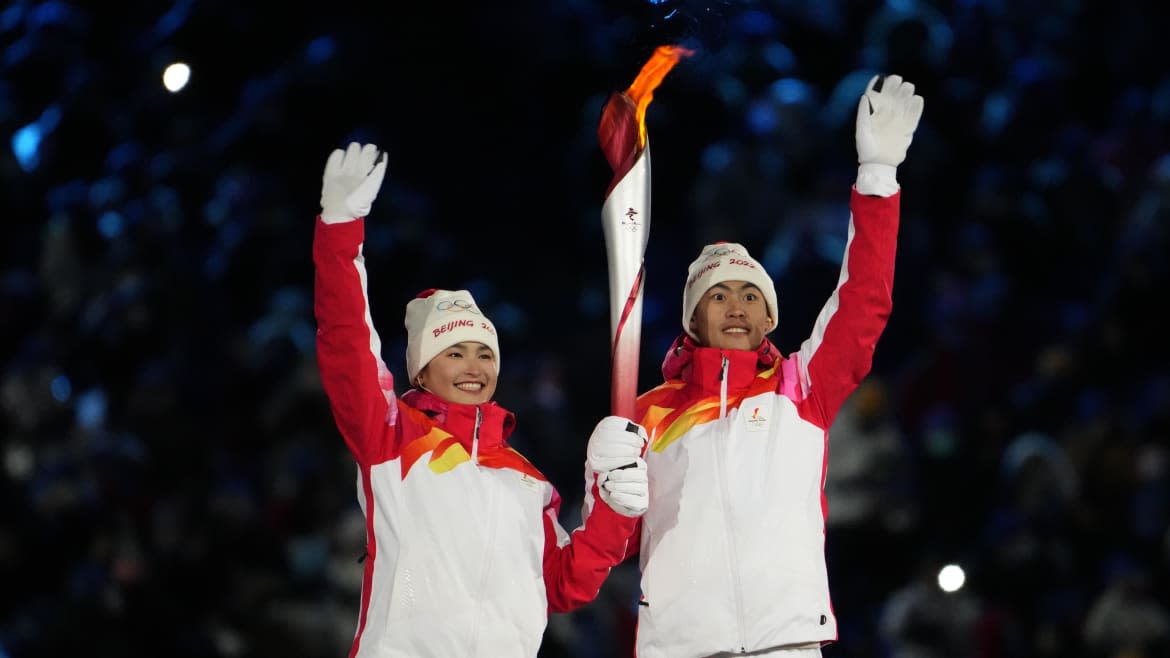China Gaslights the World by Picking Uighur Athlete to Ignite the Olympic Flame

- Oops!Something went wrong.Please try again later.
- Oops!Something went wrong.Please try again later.
China responded head-on to criticism of its human rights abuses in Xinjiang province today by choosing a young athlete of Uighur descent to light the Olympic flame at the opening of the Beijing Winter Olympics.
Western leaders including President Joe Biden had snubbed the Beijing opening ceremony as part of a so-called “diplomatic boycott” to protest China’s abuses in Xinjiang. An estimated 1 million Uighurs and members of other Muslim minorities are being held in “re-education centers” in the province, subject to torture and rape in what human rights campaigners say amounts to a campaign of genocide.
China’s PR-savvy response to criticism of its “Genocide Games” was to choose Dinigeer Yilamujiang, a 20-year-old cross-country skier, to light the flame that will burn over Beijing’s Bird’s Nest stadium for the 17 days of competition.
The Olympic torch was brought into the stadium by a series of Chinese winter sports stars born in successive decades from the 1950s onwards. The final two, both born in the 2000s, were Yilamujiang and Zhao Jiawen, 21, who will be China's first-ever competitor in the Nordic combined event. The pair smiled broadly as they lifted the torch to light the center of a snowflake-shaped cauldron.
It was a dramatic end to an otherwise low-key ceremony.
Fourteen years ago, as Beijing hosted its first Olympics, 15,000 dancers, drummers, and other performers packed the floor of the Bird’s Nest in a loud, extravagant, unapologetic celebration of China’s arrival as a global superpower.
Today, as Beijing became the first city to host both Summer and Winter Games, its second opening ceremony was more restrained. China’s absolute zero-COVID policy meant the stands were less than half-full for the briefest of opening shows followed by a chilly parade of masked athletes around the cavernous arena.
It was all in line with President Xi Jinping’s promise this week that China would deliver a “streamlined and safe” Olympics. And besides, there was no need for bombast: Two years into a global pandemic, China’s superpower status is no longer in question—and nor is Xi’s personal power after the National People’s Congress removed term limits to allow him to remain in office.
That power was on display just hours before the ceremony as Xi received another president-for-life, Russia’s Vladimir Putin, for a stage-managed summit that ended with a blunt warning to the West not to interfere in Ukraine. A display of geopolitical clout, it was an undiplomatic way to kick off a global sporting event—or would have been if Western leaders had not already snubbed the Beijing Games.
Putin is joined in Beijing by a rogues’ gallery of less-than-democratic world leaders, including President Abdel Fattah el-Sissi of Egypt and Mohammed bin Salman, the Saudi crown prince accused of personally ordering the murder of the Washington Post commentator Jamal Khashoggi.
For the 3,000 athletes from 91 countries who will compete in Beijing over the next fortnight in 15 sports ranging from snowboarding and ski jumping to curling, ice hockey, and alpine skiing, that will be just background noise—although all have been warned not to speak out on issues such as human rights during their time in Beijing.
Theirs will be far from the typical Olympic experience, however, largely because of Chinese fears that the Games could become a superspreader event that allows the new Omicron variant to take hold. Welcomed to Beijing by Olympic staff and volunteers in hazmat suits, competitors have been restricted to “closed loops” in one of three sporting clusters in and around Beijing, their food served and even prepared by robots, and facing daily PCR tests that could end their Olympic dream at any moment.
This will also be the first Winter Olympics to rely entirely on artificial snow for events in the two out-of-town mountain clusters. Organizers have brought in an army of snowmaking machines, which will get through an estimated 200 million gallons of water to ensure the success of the various skiing and jumping events.
On Friday night, for a few hours, the athletes were able to burst out of their bubble and enjoy the polite applause of spectators in the Bird's Nest stadium, who appeared to be ignoring official directives that Olympic spectators should clap rather than cheer to reduce the risk of airborne infection.
Star of the night as the athletes paraded was skeleton racer Nathan Crumpton, oiled-up and bare-chested as he carried the flag for American Samoa in temperatures dipping down to -5C. The 36-year-old, who competed in the 100m in last year’s Tokyo Summer Games, takes over from Tonga's Pita Taufatofua as the bare-chested star of the Olympic parade.
Equally oily was Thomas Bach, the IOC president, as he thanked the Chinese government, officials, doctors, and volunteers for ensuring the 24th Winter Games were able to go ahead despite the pandemic. “To the Chinese people: thank you for making these Winter Games happen, and make them happen in a safe way for everyone,” he said, before inviting Xi to officially declare them open.
Get the Daily Beast's biggest scoops and scandals delivered right to your inbox. Sign up now.
Stay informed and gain unlimited access to the Daily Beast's unmatched reporting. Subscribe now.

